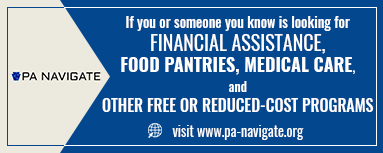We often hear that we should maintain general health and wellness, but what does that entail? At BCHIP, we collaborate with our partners in every aspect of health and wellness to make sure that everyone in Bucks County has access to the best medical care and advice.
One of the pillars of health maintenance is the regular checkup. Routine medical care should be available to everyone, and in Bucks County, the Ann Silverman Community Health Clinic in Doylestown provides free medical, dental, and social services for low-income, uninsured families in Bucks County.
Your checkup
Your routine yearly checkup is important to screen for various common health conditions, including metabolic syndrome, which increases the risk of diabetes, heart disease, and stroke. Sadly, metabolic syndrome afflicts one in three adults, according to the Cleveland Clinic.
Five markers are considered critical for determining the future risk of these conditions, and metabolic syndrome is when three or more fall out of the normal range. These markers are:
- Fasting glucose of 100 mg/dL or higher. A measurement of 100 to 125 is considered pre-diabetes; over 125 is likely Type 2 diabetes.
- A waistline of more than 35 inches for women and more than 40 inches for men
- HDL cholesterol less than 40 mg/dL for men and 50 mg/dL for women
- Triglycerides of 150 mg/dL or higher
- Blood pressure of 130/85 mmHg or higher
Healthy living
Exercise and healthy eating are the primary means of maintaining general overall health. In fact, if you discover that any of your markers are outside the optimal range, exercise and healthy eating habits alone could reverse them for some people. Your doctor, a nutritionist, or even a good book on the subject can help you make necessary changes to preserve your health for many years into the future.
The saying, “Let food be your medicine and medicine be your food,” is often attributed to the Greek doctor Hippocrates, the “Father of Medicine.” Eliminating processed foods, added sugars, and heavy consumption of carbohydrates, which is the Standard American Diet (SAD), can reverse many of the conditions that currently plague Americans.
Besides making changes to your diet, several other important steps should be taken to maintain good health into the Golden Years:
- Maintain hydration: It used to be the rule of thumb to consume half your body weight in ounces of water each day. For instance, a 150-pound person would drink 75 ounces (about 9 cups). But this is not entirely necessary, and it can actually dilute electrolytes.
However, you should drink plenty of water, especially in the summer or while exercising, and consider adding a pinch of sea salt (not regular salt) to your water to replace electrolytes and other micronutrients that can be lost due to sweating and urination. Some drinks are dehydrating (coffee) or laced with sugar (sodas and fruit juices), so they should be used in moderation.
- Maintain or reach a healthy weight: Discuss with your doctor what a healthy weight is for you, then develop a plan that combines healthy food choices and moderate exercise to get you there. You may also need to have additional blood tests to determine if your weight issues may be due to a thyroid condition, hormonal imbalance, or nutrient deficiency.
- Exercise regularly: Our bodies were not designed to sit for most of the day. If you are not used to exercising, start small, but be consistent. For example, every day, walk for 10 minutes after one meal. Then increase to walking after each of your meals. Then add some resistance exercise, such as simple weights or calisthenics. Before starting an exercise regimen, check with your doctor about any possible restrictions.
- Alleviate stress: This is easier said than done in our culture, but begin looking for ways to decrease stress, not only for your physical health, but for your mental health, as well. There are many resources to help you with this.If you feel you have a serious issue with depression, anxiety, or any other mental health concerns, there are multiple resources to help you. NAMI Bucks County is an excellent resource for those struggling with mental health issues, their own or their loved one’s. Lenape Valley Foundation Crisis Services offers mobile services as well as walk-in services. The 988 Suicide & Crisis Hotline is 988 and is available any time, 24/7, from anywhere in the country, for immediate help.
- Get plenty of sleep and rest: These are two different things. Sleep is critical for the body to perform many of its repair processes; rest refers to a state of relaxation while awake. This can include just sitting quietly and enjoying the sound of birds outside, or it can mean spending time with friends or family in a relaxing atmosphere. We need both sleep and rest to be healthy.
- Eliminate bad habits: Smoking is always bad for our health. If you want to quit smoking, try our free Quit Smoking Program. Alcohol consumption can increase the risk of various health problems. Heavy drinking, in particular, or the use of illicit drugs is always bad for health. If you need help overcoming addiction, the Bucks County Drug and Alcohol Commission (BCDAC) supports hotlines, services, and Narcan distribution.
If you have multiple changes to make in your life in order to be healthy and stay healthy, talk to your doctor about which steps to take first. Create a plan, get your family and friends on board to help you stick to it, and provide yourself with healthy incentives when you reach certain goals. In this way, you can improve and maintain good health for years to come.





